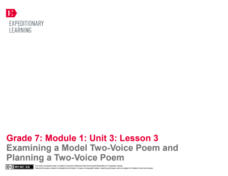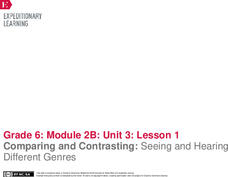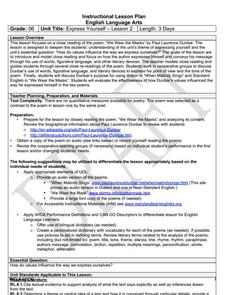EngageNY
Examining a Model Two-Voice Poem and Planning a Two-Voice Poem
Successful poetry writing requires three P's: planning, preparation, and practice. Pupils read a model two-voice poem and discuss how the author uses evidence to develop the theme. With a partner, scholars use a rubric to analyze the...
EngageNY
Mid-Unit Assessment: Small Group Discussion: How Do Modern Poems Portray Modern Adversities?
How is a poem similar to and different from a news article? Pupils use a graphic organizer to compare and contrast the two genres. Also, as part of a mid-unit assessment, scholars participate in small-group discussions based on poetry...
EngageNY
Writing the Final Narrative: Monologue or Concrete Poem
Get inspired to help those creative juices flow. Using the resource, scholars write their final, best version of their narrative monologues or concrete poems. Next, they prepare for a performance task by watching and discussing a video...
EngageNY
Grade 9 ELA Module 2: Unit 1, Lesson 13
Whether the planks hide the beating of a hideous heart or they break away to the madness beneath, their presence makes itself known in the final instructional activity of a literary analysis unit. Having gathered textual evidence from...
National Endowment for the Humanities
Walt Whitman to Langston Hughes: Poems for a Democracy
Explore the idea of democratic poetry. Upper graders read Walt Whitman, examining daguerreotypes, and compare Whitman to Langston Hughes. They describe aspects of Whitman's I Hear America Singing to Langston Hughes' Let America Be...
EngageNY
Analyzing Character: Who is Lyddie?
Character analysis can help readers feel more connected to a literary text. Scholars explore the topic by writing an acrostic poem about the main character from Katherine Paterson's novel, Lyddie. Then, pupils watch a short video to help...
EngageNY
Comparing and Contrasting: Seeing and Hearing Different Genres
Let's compare and contrast! Scholars use a Venn diagram to compare and contrast the experience of reading a poem and listening to its audio version. Next, they complete graphic organizers, comparing two different genres: a poem and a...
EngageNY
Analyzing the Significance of the Novel’s Title: Connecting the Universal Refugee Experience to Inside Out and Back Again, Part 3
What does it mean to mourn something? Scholars continue reading paragraph four from "Refugee and Immigrant Children: A Comparison" to better understand the mourning process for refugee children. Working with a partner, pupils then read...
Curated OER
Poetry Writing
Students read various examples of poetry and create a poetry portfolio. In this poetry writing activity, students work at their own pace to complete a poetry portfolio with examples of the different poetic forms demonstrated. Students...
Curated OER
Response to Literature: Anecdotal and Saga Memoir Poems
Students differentiate between anecdotal and saga memoir poems. In this response to literature lesson students analyze poems written by others then analyze incidents from their own lives to determine whether they meet the criteria for...
Curated OER
Civil War
Historical poetry is lyrical in form and rich with content. After examining the differences between the Northern and Southern states before and during the U.S. Civil War, learners complete a Venn diagram and create an illustration of the...
Scholastic
Ready to Research Owls
Researching facts about owls can be a hoot for your class. Let them wisely collaborate on this writing project. The resource is the second part of three parts. It is best to use all three lessons in order.
EngageNY
Developing Reading Fluency: Selecting a Text and Practicing Reading Aloud
Young readers continue to strengthen their fluency skills with a text of their choosing. The teacher first engages the class with an audio recording or read-aloud of a short poem, modeling for children how to read fluently. Next it's...
EngageNY
Developing Reading Fluency: Criteria for Reading Aloud
Third graders develop their reading superpowers in a lesson plan on fluency. After first listening to an audio recording or teacher read aloud, the class works together identifying criteria for fluent reading, focusing on phrasing, rate,...
Curated OER
Signing a Poem
Students interpret poetry though movement. In this poetry lesson students take a poem they've previously read and discussed in class and work in pairs to develop gestures for each line.
University of California
The Civil War: The Road to War
The United States Civil War resulted in the highest mortality rate for Americans since the nation's inception. Delve deeper into the causes for the drastic separation of states with a history lesson plan that features analysis charts,...
K20 LEARN
Blue or Gray? Perspectives on the Civil War
Using primary and secondary sources, such as letters and diaries from soldiers and civilians, learners consider why people fought in the American Civil War. A role-playing Historical Mingle activity, as well as discussion questions and...
Curated OER
Lesson Plan - The Barbara Frietchie Story – Fact or Fiction?
Young scholars differentiate between fact and legend. In this Barbara Freitchie lesson, students read poetry and non-fiction accounts regarding the story of Freitchie. Young scholars analyze the story of the American patriot to determine...
Curated OER
Where I'm From: Imitative Poem
Students analyze 'Where I'm From' by George Ella Lyon. In this poetry lesson plan students examine the content and structure of the poem and mimic it to create a similar poem of their own.
Curated OER
Commemorative Coin Poetry
Students discuss and research an individual or event that has been memorialized on a commemorative coin. They use the information they found to write acrostics, creating stand-up accordion books to display the poems.
EngageNY
Narratives as Theater: Esperanza Rising, from Novel to Script
Calling all thespians! Working in small groups, pupils practice reading and performing a readers theater script for the novel Esperanza Rising. Next, they read aloud passages from the novel and use an anchor chart to compare the script...
EngageNY
Coda: What Gives This Story Power? Re-Examining Powerful Stories
Writers consider what makes a story powerful as they listen to a short story about Frederick Douglass. Once finished, small groups complete a worksheet to analyze what makes the story so enduring.
Maryland Department of Education
The Concept of Diversity in World Literature Lesson 12: Author's Purpose - Yeats and Achebe
Is there such a thing as fate/luck? Can one fight destiny? As part of their study of Chinua Achebe's purpose in writing Things Fall Apart, class members answer these questions from Achebe's point of view and then from William Butler...
Curated OER
6th Grade: Express Yourself, Lesson 2: Close Read
The second activity of a pair about Paul Laurence Dunbar, this plan focuses in particular on his poem, "We Wear the Masks." After a short historical introduction, class members conduct a series or readings, marking up the text and...

























